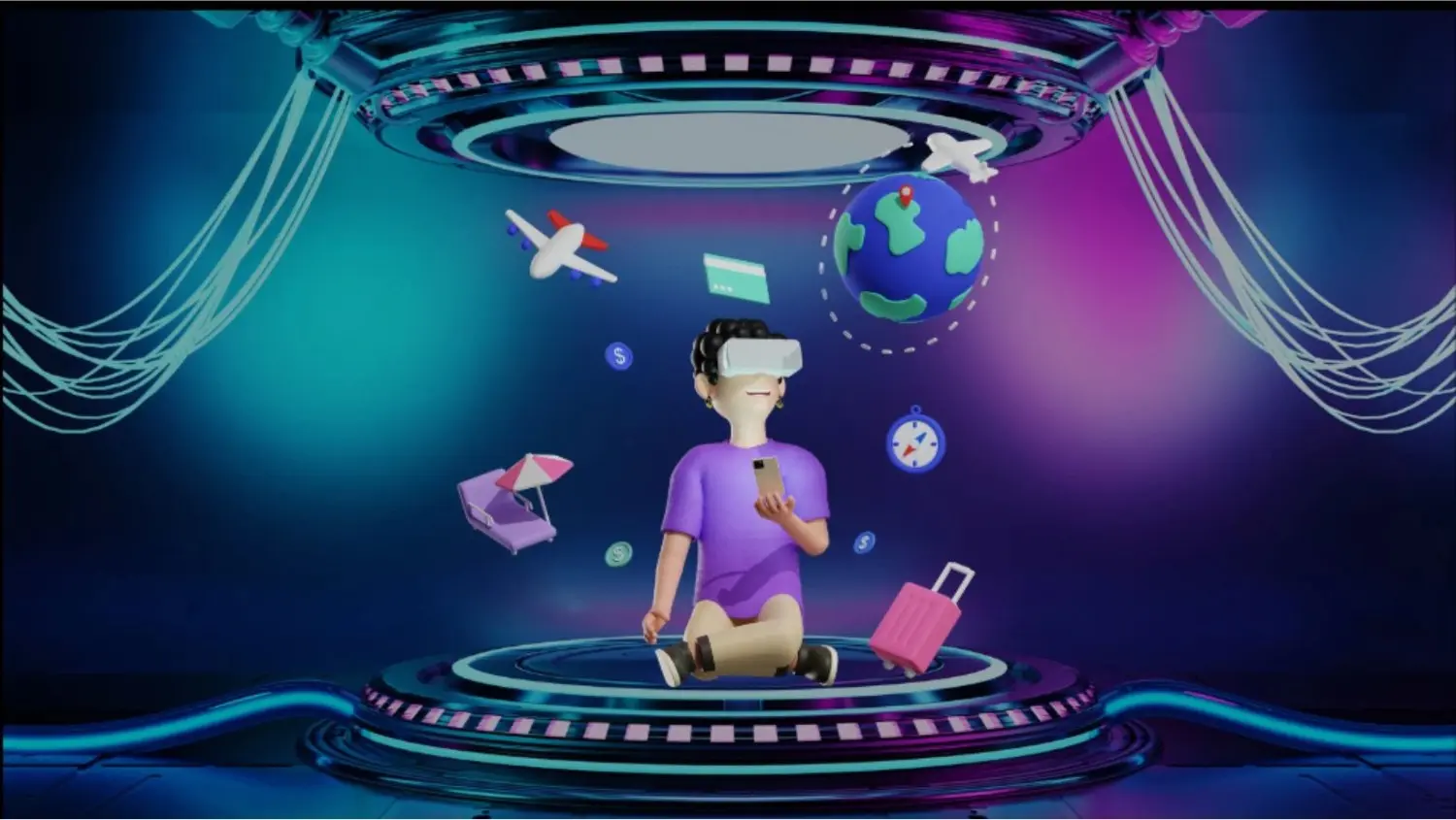Introduction
Metaverse in Real Estate Industry: The metaverse, a virtual universe where users can interact in a shared space, is set to revolutionize the real estate sector in ways we never thought possible. Imagine a world where you can buy, sell, and even design your dream home all from the comfort of your own virtual reality headset.
Gone are the days of trudging through open houses, dealing with pushy real estate agents, and spending hours on end searching for the perfect property. In the metaverse, you can take virtual tours of properties, customize your home to your exact specifications, and even have virtual housewarming parties with your friends. But it’s not just about buying and selling properties.
The metaverse also opens up a whole new world of opportunities for commercial real estate. Businesses will be able to create virtual storefronts, office spaces, and even entire virtual shopping centers (How will the metaverse change or transform the marketing industry).
Can you imagine visiting your favorite store without ever having to leave your couch? And it’s not just a pipe dream. Tech giants like Facebook and Google are already investing heavily in the metaverse, with Facebook CEO Mark Zuckerberg stating that “the future is private, and the future is social, and the future is in the metaverse.”
But the metaverse isn’t just about convenience and fun. It also has the potential to democratize the real estate market. In the physical world, buying property can be incredibly difficult for marginalized communities, but in the metaverse, anyone with internet access can participate in the market. And the numbers don’t lie. According to a report by Goldman Sachs, the metaverse economy could reach a staggering $3 trillion by 2030. That’s a lot of virtual real estate.
But let’s not get ahead of ourselves. The metaverse is still in its infancy, and there are sure to be growing pains. We’ll need to figure out how to handle virtual property rights and regulations, and we’ll need to ensure that everyone has access to the metaverse, regardless of their socioeconomic status.
But the future is looking bright for the metaverse and the real estate sector. As the great philosopher, Yoda, once said, “Always in motion is the future.” And the future of real estate is in the metaverse.
Applications of Metaverse in Real Estate
The Metaverse has a wide range of applications in the real estate sector, from virtual tours and virtual design, to virtual meetings and virtual property sales. Some of the key applications of Metaverse in real estate include:
1- Virtual Tours:
Real estate companies are using virtual reality and 3D technology to create virtual tours of properties. This allows potential buyers to view properties remotely, without having to physically visit them.
According to a report by Goldman Sachs, virtual tours will become the norm in the real estate industry and will account for a significant share of the metaverse economy.
2- Virtual Design and Staging:
The Metaverse also allows for virtual staging and design of properties, which allows potential buyers to envision themselves in a property and see how it would look with their own furniture and decor. This can also help developers and architects to showcase their properties in a more engaging way.
Discover the Future: Metaverse Revolutionizing Real Estate!

Explore our other insights!

How will Metaverse Change the Education Sector?
Introduction Metaverse in Education Sector: The Metaverse is limited to games and there are many things the Metaverse

How will Metaverse Transform the Travel and Tourism Sector?
Introduction Metaverse in Travel and Tourism Sector: The coronavirus pandemic has revealed one way the travel industry can

How will the Metaverse Change the Healthcare Industry?
Introduction Metaverse in the Healthcare Industry: Technological advances in the field of mental health assist healthcare facilities in
3- Virtual Meetings and Walkthroughs:
The Metaverse allows for virtual meetings and walkthroughs of properties, which can improve communication and collaboration among real estate professionals. This can also help to democratize access to commercial real estate investment opportunities, by allowing more people to participate in the market.
Explore our other insights!

How will Metaverse Change the Education Sector?
Introduction Metaverse in Education Sector: The Metaverse is limited to games and there are many things the Metaverse

How will Metaverse Transform the Travel and Tourism Sector?
Introduction Metaverse in Travel and Tourism Sector: The coronavirus pandemic has revealed one way the travel industry can

How will the Metaverse Change the Healthcare Industry?
Introduction Metaverse in the Healthcare Industry: Technological advances in the field of mental health assist healthcare facilities in
4- Virtual Property Sales:
The Metaverse also opens up a new world of opportunities for virtual property sales, allowing users to buy and sell virtual land, houses, and other properties in a virtual world. This is particularly beneficial for marginalized communities who may have difficulty accessing the physical property market.
5- Virtual Commercial Real Estate:
The Metaverse also allows for businesses to create virtual storefronts, office spaces, and even entire virtual shopping centers. This can be a game-changer for commercial real estate and can help businesses to reach a wider audience and drive revenue.
6- Virtual Property Management:
The Metaverse also allows for virtual property management, which can help property managers to keep track of their properties and make sure they are being maintained properly.
These are just a few examples of the many ways in which the Metaverse is revolutionizing the real estate sector. As Mark Zuckerberg, CEO of Facebook said, “The future is private, and the future is social, and the future is in the metaverse.” It’s clear that the Metaverse has the potential to change the way we think about real estate and open up new possibilities for the industry.
Unlock Real Estate's Future: Explore Metaverse Revolution!

Real Estate Companies Investing in Metaverse?
1. Zillow, a leading online real estate marketplace, recently acquired virtual staging startup, dFusion, to enhance their virtual tours and make it easier for buyers to envision themselves in a property. With this acquisition, Zillow aims to use virtual and augmented reality to create more immersive and personalized home-shopping experiences.
2. Virtual reality company, VRtuoso, has developed a platform that allows real estate developers and architects to create highly detailed, interactive 3D models of properties. This platform is being used by several real estate developers and architects to showcase their properties in a more engaging way.
3. RealCrowd, a platform for commercial real estate investing, is using virtual reality to allow investors to take virtual tours of properties and get a better sense of the layout and condition of the properties. The company has raised $4.5 million in funding and aims to use virtual reality to democratize access to commercial real estate investment opportunities.
4. Virtual reality company, VirtualAPT, is working with real estate developers and rental property management companies to create virtual tours of apartments and rental properties. The company’s platform allows potential renters to take virtual tours of properties and apply for rental units online.
5. Virtual real estate marketplace, Virtual Realms, allows users to buy and sell virtual properties in a virtual world. The company aims to create a virtual version of the real estate market, where users can buy and sell virtual land, houses and other properties.
6. Virtual reality company, InsiteVR, provides a platform for architects, engineers, and construction professionals to collaborate on building design and construction projects in virtual reality. The company has raised $2 million in funding and aims to improve communication and collaboration in the construction industry.
7. Virtual reality company, Mimesys, is developing a holographic telepresence platform that allows users to communicate in a shared virtual environment. The company aims to use this technology to improve communication and collaboration in the real estate industry, by allowing real estate professionals to hold virtual meetings and walkthroughs of properties.
8. Virtual reality company, Virtual Experience, is developing a virtual reality platform for real estate marketing and sales. The company’s platform allows real estate developers and agents to create virtual tours, walkthroughs and presentations of properties, which can be accessed by potential buyers and renters.
9. Virtual reality company, Holos, is developing a platform that allows users to create, share and explore virtual spaces in a social context. The company aims to use this technology to create a virtual version of the real estate market, where users can buy and sell virtual land, houses and other properties.
10. Proptech company, Matterport, which specializes in 3D and virtual reality (VR) technology for real estate, has seen its valuation soar to over $1 billion in recent years. The company’s technology allows for virtual tours of properties, making it easy for potential buyers to view properties remotely. The company has raised more than $100 million in funding and has partnerships with over 60,000 real estate agents and over 1,000 property management companies globally.
Future Forecast of Metaverse in Real Estate
In 20 years, the metaverse technology will probably be like, super advanced and stuff. We’ll probably be able to like, fully customize our virtual homes and make them super realistic and cool. Like, you’ll be able to change the color of the walls, add virtual furniture and even virtual pets.
Also, there will be virtual real estate agents and stuff, so you won’t have to deal with any of those annoying real estate agents in real life. And like, buying and selling properties will probably be like, super easy and fast in the metaverse. Just like how e-commerce changed the way we shop, the metaverse will change the way we buy and sell properties.
In commercial real estate, virtual storefronts and office spaces will be like the norm and we’ll probably be able to fully shop and work in the metaverse. And like, it will probably be so advanced that we’ll be able to like, fully experience and feel the properties in the metaverse, just like in real life.
According to a report by Goldman Sachs, the metaverse economy could reach a staggering $3 trillion by 2030, which means that the metaverse will have a huge impact on the economy and industries. As Mark Zuckerberg, CEO of Facebook said, “The future is private, and the future is social, and the future is in the metaverse.”
So yeah, the metaverse technology will probably be like, super cool and advanced in the real estate world in 20 years. It will change the way we buy and sell properties, and it will be so convenient that we’ll never have to leave our own homes to buy or rent properties ever again.
Revolutionizing Real Estate: The Rise of AR and VR Headset Technology
Augmented reality (AR) and virtual reality (VR) headsets are becoming increasingly popular in the real estate industry, as they allow for virtual tours and walkthroughs of properties, as well as virtual design and staging. These technologies are making it easier for potential buyers to view properties remotely, and for architects and developers to showcase properties in a more engaging way.
One of the key players in the AR/VR headset market for real estate is Matterport, a proptech company that specializes in 3D and VR technology for real estate. Matterport’s technology allows for virtual tours of properties and has been widely adopted by real estate agents and property management companies. The company’s valuation has soared to over $1 billion in recent years, with more than 60,000 real estate agents and over 1,000 property management companies globally using its technology.
Another player in the AR/VR headset market is Zillow, an online real estate marketplace that recently acquired virtual staging startup, dFusion, to enhance their virtual tours and make it easier for buyers to envision themselves in a property. Zillow aims to use virtual and augmented reality to create more immersive and personalized home-shopping experiences.
In the future, we can expect to see further improvements in AR/VR headset technology for real estate. One of the key areas of improvement will be in the resolution and clarity of the virtual tours. We can expect to see more realistic and detailed virtual tours, with higher resolution images and more accurate representations of properties.
Another area of improvement will be in the interactivity of the virtual tours. We can expect to see more interactive virtual tours, where users will be able to walk through properties and interact with virtual furniture and decor, allowing them to envision themselves in the property.
We can also expect to see more advanced virtual design and staging tools. These tools will allow architects and developers to create highly detailed, interactive 3D models of properties, and will allow potential buyers to customize and design their dream homes in a virtual environment.
The technology for AR and VR headsets is advancing rapidly and the future of the technology is promising for real estate industry. As more companies invest in the technology, we can expect to see more realistic and engaging virtual tours and walkthroughs of properties, which will make the process of buying and selling properties more convenient and efficient.

Navigating the Metaverse: How to Find the Perfect Technology Partner for Your Real Estate Venture
Yo, so you wanna find a technology partner to implement the metaverse in real estate? Here’s what you gotta do:
1. Look around on the internet, like on Google or something, and search for companies that specialize in the metaverse and real estate.
2. Ask your friends or people in the industry if they know of any companies that do this kind of stuff.
3. Go to events and conferences related to the metaverse and real estate, and talk to people there. They might know of some companies that can help you out.
4. Make a list of all the companies that you’re interested in and do some research on them. Look at their website, read reviews and check out their portfolio.
5. Reach out to the companies on your list and ask if they’re interested in working with you. Tell them about your project and ask if they have any experience in the metaverse and real estate.
6. Once you find a company that you like, set up a meeting or call to talk about the project in more detail and see if you’re a good fit.
And that’s it! Just follow these steps and you’ll be able to find a technology partner to implement the metaverse in real estate in no time!



